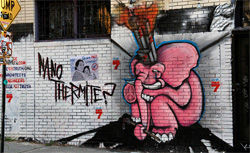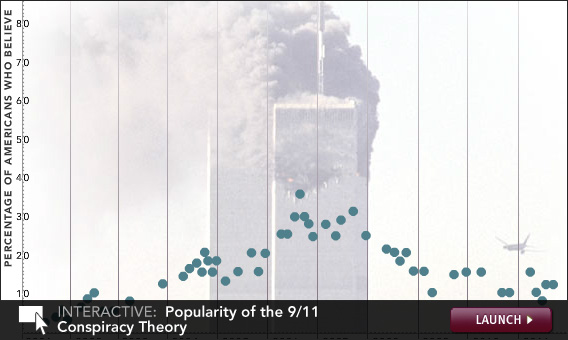You're Not Paranoid if It's True
What happens when believers in 9/11 conspiracy theories change their minds.
The man who created the single most influential piece of propaganda about the 9/11 conspiracy is now ambivalent about the movement he helped make popular. "There's a certain thing called tact that you need when you're dealing with the public," says Dylan Avery, director of the film Loose Change, released in 2005 and since viewed tens of millions of times online. "And I think that is a certain approach that a lot of people lack."
Avery should know. He has been accused of being a traitor, a spy, or—slightly more charitably—just plain "sloppy." According to 9/11 conspiracy proponent Michael Ruppert, the movement has been hurt by its acceptance of some of the (relatively speaking) more absurd notions that were featured prominently in the early versions of Loose Change, notions that he says were planted as disinformation by those looking to discredit conspiracists. "That's one of many reasons why I completely cut myself off from the 9/11 Truth movement in 2004," Ruppert says. "They just swallowed too many poison pills."
That's the thing about conspiracy theories and the people who believe in them: One man's poison pill is another's smoking gun. For much of the decade, 9/11 conspiracy theorists were united by (and benefited from) opposition to the war and hatred of George Bush. Not even direct assaults on the facts underlying their theories had much impact. As it turns out—as it usually turns out with conspiracy theories—the people most adept at weakening the "9/11 Truth" movement were the truthers themselves. Because conspiracy theorists can't just have disagreements. If you disagree with a conspiracy theorist, then you probably belong to the conspiracy.
***
In 2008, Alex Jones' website alleged that young New York-based conspiracist Nico Haupt was actually an undercover agent. Haupt was one of the very first conspiracy theorist leaders, starting to research and organize on the morning of 9/11. He was the first to report some of the military training exercises that were going on during the attacks, which Ruppert called "the holy grail" of 9/11 research and which the movement would use to argue that the military had been sabotaged from within.
But in 2005, Haupt started preaching a theory, referred to disparagingly by other conspiracists as the "no-planer" hypothesis, that the footage of jetliners hitting the WTC seen live on TV that morning was actually of holograms. Around that time, he started accusing other leaders in the movement, including Jones and David Ray Griffin, of being government plants themselves. At the end of 2006 he nearly got in a fist fight with Rolling Stone columnist Matt Taibbi, and by May 2008 he was accused of assaulting fellow conspiracists protesting at Ground Zero. He has not really been heard from since, says Ruppert, who calls him "a fringe guy who had a good heart who went crazy."
Jones would disagree. He and Luke Rudkowski, a young activist who has been described as a Jones protégé, took Haupt's increasingly outlandish behavior and violence as evidence that he was co-opted by the government. "This is a classic COINTELPRO operation, straight out the 1960s," Jones' website reported.
Conspiracists are not being entirely irrational when they express their fears of government infiltration. The FBI's counterintelligence operation, known as COINTELPRO, spied on and sometimes infiltrated suspected Communist groups, civil rights groups, anti-war activists, and hate groups, among others, until the program was exposed and shut down in 1971. The FBI was using some of these tactics, including surveillance of journalists, as late as 1987. COINTELPRO has become shorthand in the 9/11 conspiracy world for almost any source of information that a conspiracist disagrees with. Because there are so many disparate elements in the 9/11 conspiracy theory world, the charges will often be lodged against fellow conspiracy adherents.
The key piece of evidence cited to allege that government still spies on conspiracy groups is a 30-page 2008 paper titled "Conspiracy Theories" co-written by Cass Sunstein, the current administrator of the Office of Information and Regulatory Affairs. In it, Sunstein says that domestic and foreign conspiracy theories pose "real risks to the government's anti-terrorist policies" and argues that the government should be "cognitively infiltrating" groups that purvey these theories. Sunstein proposes having the government send undercover operatives and paid "independent" contractors onto online message boards and websites—and into some real-life groups—in order to undermine the theories.
There's no evidence that such a program is currently being undertaken by the Obama administration, but the paper set the conspiracy world aflame. "Cognitive infiltration" has become the latest buzz phrase in conspiracy circles. (Griffin devoted his last book to the topic.) In late June, one of the first alleged "cognitive infiltrators" was uncovered.
***
Charlie Veitch is a 31-year-old British anarchist living in London. On 9/11, he happened to be on vacation in Thailand and remembers watching a TV in a beachside bar as the towers burned. He cut his trip short and soon took a job in the City, London's Wall Street. He did not encounter his first 9/11 conspiracy theory, he says, until 2006, when he watched Alex Jones' TerrorStorm, which describes a history of alleged false-flag terror attacks and then makes the case that 9/11 was such an event. Veitch was instantly hooked. He started to watch all of the 9/11 conspiracy videos he could find on the Internet, which turns out to be quite a few.
In 2009, Veitch lost his job. By then he had started occasionally posting videos to YouTube of himself and friends heckling Scientologists or breaking out into song during the "People's Question Time" with London Mayor Boris Johnson. After losing his job, Veitch started making the guerilla videos on a full-time basis and launched an activist group called the Love Police devoted to "confronting the authority state" in the United Kingdom.
Nineteen days after starting the Love Police, Veitch caught the attention of Alex Jones with a video of himself being confronted by police officers after trying to film the U.S. Embassy in London. Jones invited Veitch onto the show to discuss what they described as the U.K. police state, and Veitch became an occasional guest. Veitch's site gained a following, which in turn allowed him to solicit enough donations to afford to pay the rent. He also started appearing occasionally on Russia Today, the Russian-sponsored propaganda TV network that traffics heavily in conspiracy theories. In June 2010, Veitch was arrested while doing his provocateur thing at the G-20 summit in Toronto, and he was arrested again the day before the royal wedding in April on suspicion of "conspiracy to cause a public nuisance." He remained a relatively minor figure in the 9/11 conspiracy world.
Then he was selected as a subject in a documentary called 911 Conspiracy Road Trip, to be broadcast on the BBC this week. The documentary shows five British 9/11 conspiracy theorists as they travel to Ground Zero, the Pentagon, and Shanksville, Pa., where they meet people directly affected by the attacks. Veitch was given the chance to grill controlled-demolition experts, professors of metallurgy, some of the people who helped build the World Trade Center in the 1970s, retired CIA analysts, eyewitnesses, and aviation experts. In Pennsylvania they also spoke with Alice Hoagland, the mother of Mark Bingham, one of the passengers on Flight 93 who helped fight the hijackers.
By the third day of actually speaking with people he had believed responsible for covering up mass murder, Veitch was starting to believe he was wrong about 9/11. "After meeting all of these alleged conspirators that were supposed to be in on it, I realized they were normal family men," Veitch said. "There wasn't anything conspiratorial about them." It was when he questioned a demolitions expert atop the rebuilt World Trade Center 7 that he finally changed his mind about 9/11.
"It's not so much a matter of technical evidence, it's more of a change in mindset that I've had," Veitch said. "Going from a paranoid mindset to a less paranoid mindset."
***
Veitch announced his "conversion" on June 29, 2011, on his blog and YouTube channel, saying that he hadn't been wrong to believe that the government was capable of orchestrating 9/11, but he had been wrong about the facts:
I think because the government has lied about the weapons of mass destruction in Iraq and hundreds of thousands of innocent civilians have been killed, we do suspect foul play when other terrible events [happen] … and if governments can lie and kill half a million people, why wouldn't they lie about killing 3,000? It doesn't take an incredible leap of fantasy or faith or gullibility. We're not gullible, we're just truth seekers. And the 9/11 Truth movement is trying to find out the truth about what happened. … [But you should] not hold onto religious dogma. If you're presented with new evidence, take it on, even if it contradicts what you or your group might be believing or wanting to believe. You have to give the truth the greatest respect, and I do.
This relatively mild renunciation by a relatively minor advocate of 9/11 conspiracy theories was treated as major news in the conspiracy community. Veitch received threatening phone calls and emails. Donations to his site dried up. He was accused of having taken a payoff from the BBC, of having been subject to mind control by "neuro-linguistic programming experts," of being under hypnosis by British illusionist Derren Brown, and of being a Sunstein-sent cognitive infiltrator. "The best theory I heard has been that I have been deep undercover MI6 or CIA agent," Veitch said. "[They say] I was basically a one-man sleeper cell waiting to discredit the 9/11 Truth movement and destroy what they call 'the resistance' from within." Last month, Veitch's site was hacked and a message was sent to his 15,000 subscribers calling him a child abuser. "When your mom phones you saying, 'Why have you sent me something admitting to being a child molester?' it's not very good," Veitch said.
"People went ape-shit over this Charlie Veitch, I couldn't believe it," says Avery, director of Loose Change. "I was like, 'Really?' I mean, I had never even heard of this guy until now." But in the 9/11 Truth movement, apostasy at any level just provides another excuse to unleash paranoia.
It's this mentality that has pushed Avery away from the movement over the last four years. "Maybe he just changed his mind," Avery said, referring to the Veitch hysteria. "I mean, people change their minds." Avery has had his own issues with Jones and his audience over the years, and speculated that some of the death threats that Veitch received came from Jones' listeners. "That kind of mob mentality [is] the very thing that we were claiming to fight, the 'You're with us or with the terrorists' mentality," he said.
"That's one of the reasons I had to back away from the movement in general," he said. "I was afraid I was becoming one of them—someone who sees conspiracy around every corner."

